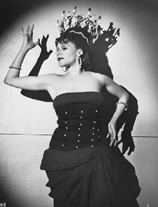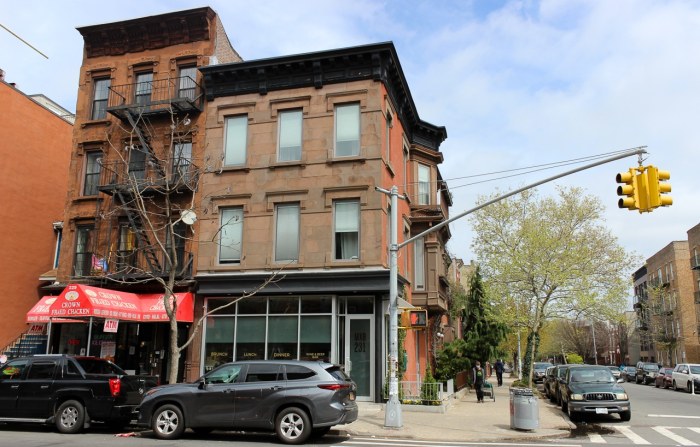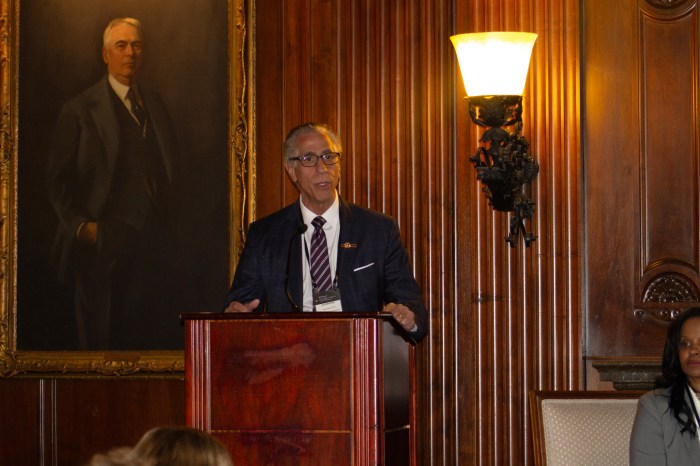Dunham and Richards Celebrations, Audra’s and Stacey’s Music Magic, Energizer Kitty
Strong, ferociously talented black women ruled the week, beginning with the fantastic memorial to Katherine Dunham at Symphony Space on September 30. Exhaustively produced by Dr. Glory Van Scott, the double line of eager attendees, stretched down both Broadway and 95th Street. Inside, we were rewarded by ravishing performances by dance companies which included Alvin Ailey, Dance Theatre of Harlem, Charles Moore, Fred Benjamin, Louis Johnson, Joan Peters, Philadanco, and The Katherine Dunham Children’s Workshop which, more than anything else, conveyed the sheer joy of Dunham’s timeless, inspiriting technique.
A standout dancer of the day was the gorgeous Linda-Denise Fisher-Harrell’s tour-de-force delivery of Ailey’s “Cry,” but to single any one performer out seems trifling, as the stage was awash for more than four hours with staggeringly fluid, fluent talent. Arthur Mitchell remarked that, although he is classically trained, just the wonderful sound of the drums and the sight of all that flamboyant movement made him want to shake it to the rhythm, a feeling shared by us all. Other speakers included Dunham’s daughter, an overcome Marie-Christine Dunham Pratt; Charles B. Wrangel; Dunham’s longtime dance partner Vanoye Aikens; Julie Belafonte and New York Times’ dance critic, Jennifer Dunning, who recalled Dunham’s calling her one Sunday afternoon, asking her if she was going to attend a certain dance event. “Well, it’s Sunday, my day off. I’m on deadline and have a lot of work to do,” Dunning said, to which Dunham replied, “This IS your work!” Dunning dutifully heeded the truth of those words and went to the dance. Gil Noble eloquently covered Dunham’s importance as a sociologist/activist, bringing the culture of Caribbean countries into public eye and exhorted, “You do this woman a disservice if you don’t do the best you possibly can to alleviate the miserable conditions around us. Kids coming up today, who are being narcotized, need to know that such a wonderful human being existed.”
The day ended fittingly with the release of 97 doves on 95th Street, in honor of Dunham’s glorious number of years on this earth. She once said, “My work has been called anthropology in New Haven, sex in Boston and in Rome—art!” I saw her in Hawaii a few years ago at a special University appearance. The audience kept besieging her with tiresome, unanswerable, politically correct queries which clearly bored her, but when I asked her for her memories of the great Ethel Waters, her eyes blazed with fierce, undimmed indignation as she recalled how cruel Waters was to her when they did “Cabin in the Sky” together on Broadway in 1940. Always outspoken, Dunham chided Louisville audiences in on tour 1944, for sitting in their segregated theatre, and even put a “Whites Only” sign on her derriere once, as she thought this was the view they deserved.
The rich life of another pioneer, Lloyd Richards, was celebrated at his tribute at the Bernard B. Jacobs Theatre (10/3). As Dean of the Yale School of Drama and director of the revelatory 1959 “A Raisin in the Sun,” Richards’ entire career was groundbreaking. Brian Stokes Mitchell began things beautifully with a dulcet rendition of one of Richards’ favorites, “Jamaica Song.” Powerful divas extolled Richards, including an amusing, ebullient Mary Alice, Ruby Dee who likened him to the essential flour in any loaf of bread, and Cicely Tyson, who recalled first meeting him as a model when they posed for the cover of a dime store novel together. She said that, with Richards as her acting teacher, she found “the rock” which convinced her insecure, doubt-filled self that she could indeed be an actress and closed by quoting the moving words of, and in, her “Miss Jane Pittman” character. Angela Bassett remembered how Richards always warned her about “waving the rubber chicken” (i.e., over-acting).
Those words should have been more heeded by two speakers, the ever-insufferable James Lipton—who pompously managed to turn his speech into an opportunity for self-aggrandizement (“I was this Dean’s Dean”)—and Courtney B. Vance, who got a bit carried away during an over-long eulogy, even losing his place in the middle of a rant.
Forget Barbra Streisand. I doubt if that by-now overpaid, Supreme Narcissist could have come close to matching the magic Audra McDonald provided at her Jazz at Lincoln Center performance on October 11. Backed by a ten-piece orchestra, her clarion voice rang out in an array of standards and newbies. I especially liked her intensely affecting rendition of John Mayer’s “My Stupid Mouth,” which she confessed she’d been ignorant about, initially asking, “What show is this from?” of Musical Arranger Ted Spurling. Also good: “I Wanna Get Married,” with sprightly, hilarious accompaniment by that song’s composer, Nellie MacKay, in which McDonald was both satiric and, ultimately, movingly confused by its finale.

More great pipes were found in the person of Stacey Kent at Feinstein’s at the Regency (10/3). Imperturbably chic in Tuleh and Prada, Kent’s voice, a pleasing combination of the lilt of Blossom Dearie with the radiant phrasing of the young Billie Holliday, as well as winningly goofy persona, richly informed songs like “So Many Stars,” Jobim’s “Corcovado,” “A Sleepin’ Bee,” and even “The Trolley Song.” Her husband, Jim Tomlinson, lent support with seductive sax stylings and, when I told Kent afterwards that she should sing Jobim’s divine “Waters of March,” she immediately did it for me, lusciously a capella, and rushed to tell her band about it.
The week before, Kitty Carlisle Hart opened the same room (9/26) and wowed us all once again with her indefatigable character and lifetime of knowledge she brings to a lyric, at age 96. To hear her sing “September Song” is to truly know what it’s all about, but nothing matched the seduction of her remembering Cole Porter and how he changed the landscape when, “Once, in the South of France, I suddenly heard this strange new music …” and her accompanist, David Lewis, launched into a sinuous rendition of “What is This Thing Called Love?” To hear how this song shouldn’t be done, see Gwyneth Paltrow’s nasal attitudinizing in “Infamous,” the why’d-they-do-it-they-shouldn’t-have new Truman Capote movie.
At the after-party, upstairs in “Kitty’s Room,” I met Anne Kaufman Schneider, daughter of playwright George S. Kaufman, and asked her what her favorite play of Dad’s was. “’Once in a Lifetime,’” she answered. “It’s still so funny and superior I think to ‘The Man Who Came to Dinner,’ which is so popular, for some reason.” I had to ask her about Mary Astor, whose adulterous diary-jottings about George S.’s boudoir prowess constituted one of the 1930s’ greatest scandals and nearly lost Astor custody of her child. “My father never mentioned her name,” Schneider sad, “but wasn’t she beautiful? I remember, during that time, we were in Hawaii, staying at the Moana Hotel in Waikiki and then, for some reason, suddenly moved to a private home on the beach. There was a little girl staying next door to us. It was Shirley Temple!”
Contact David Noh at Inthenoh@aol.com.
gaycitynews.com



































